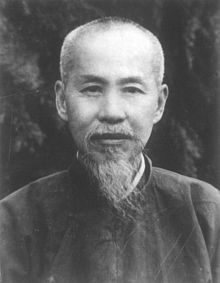Xiong Shili
| Xiong Shili |
|
|---|---|
 |
|
| Born | 1885 Huanggang, Huangzhou District, Hubei, Qing Empire |
| Died | 23 May 1968 (aged 82-83) Shanghai, People's Republic of China |
| Organization |
Tianjin Nankai High School Peking University Nanjing University |
| Movement | New Confucianism |
Xiong Shili (Chinese: 熊十力; pinyin: Xióng Shílì; Wade–Giles: Hsiung Shihli, 1885 – May 23, 1968) was a modern Chinese philosopher whose major work A New Treatise on Consciousness-only (新唯識論, Xin Weishi Lun) is a Confucian critique of the Buddhist "consciousness-only" theory popularized in China by the Tang Dynasty pilgrim Xuanzang.
Xiong is widely regarded as the thinker who laid down the basis for the revival of Confucianism during the twentieth century, and the main voice in contemporary Chinese philosophy who called for a revival of the Confucian dao. He felt it could provide a guide for the country during its tumultuous period following the May Fourth Movement in 1919. He felt that national survival was predicated on a sense of community, which in turn could only come from trusting commitments from the people involved. He believed that the most urgent task for the educated elite in China was to raise the cultural awareness and sensitivity of the people that the clash between the West and China was not solely a clash of economic strength and military might, but also a conflict between basic human values. While he led a fairly secluded life throughout his career as a teacher and his association with the academic community did not begin until he was in his late thirties, his views have influenced scholars to this day.
Xiong was born to a poverty-stricken family in the Huanggang, Hubei. His father was a village teacher who died of tuberculosis when Xiong was ten years old, forcing him to work as a cowherd for his neighbor to support his family. By his twenties, he was a dedicated revolutionary in the Republican Revolution that ended the Qing Dynasty and ushered in China's first republic. Disgusted over corruption in politics, and what he termed "latent feudalism" among the revolutionaries, he began to study Buddhism in 1920 at the China Institute for Inner Learning (支那內學院) in Nanjing headed by Ouyang Jingwu (欧阳境无), perhaps the most influential lay Buddhist thinker of the twentieth century. At this time, the Chancellor of Peking University, Cai Yuanpei, sent Liang Shuming (梁漱溟, 1893-1988) to Nanjing to ask Ouyang Jingwu to recommend one of his students to teach Buddhist Logic (因明學, Yinming Xue) and Yogacara philosophy (唯识论) in the Philosophy Department at Peking University. Ouyang Jingwu recommended Xiong and passed Liang Shuming a draft on which Xiong had been working entitled An Outline of Consciousness-only. Impressed with Xiong's work, Cai Yuanpei, on Liang's recommendation, invited Xiong to Peking University where Xiong, much to the chagrin of Liang Shuming, destroyed his draft and instead wrote and published in 1932 what is now considered his major work A New Treatise on Consciousness-only (新唯识论, xin weishi lun). In his New Treatise, Xiong criticized the old Yogacara masters, such as the brothers Vasubandhu and Asanga (4 c.), as well as their successors, Dharmapala (530-561) and Xuanzang (c. 602–664), for their theory of seeds in which seeds, stored in the eight or 'storehouse' consciousness (alayavijnana), become discrete causal agents that 'perfume' (bring into being) all mental and physical dharmas. However, he also used the insights of Buddhism to reconstruct Confucianism. Much of his philosophy is influenced both by Buddhism and by his study of the Book of Changes, which he regarded as the fundamental classic of Confucianism.
...
Wikipedia
